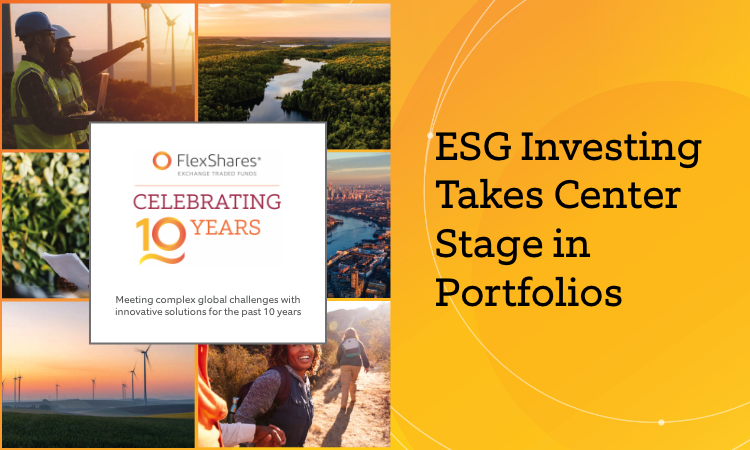
When we launched FlexShares ETFs 10 years ago, ESG1 investing was a relatively small niche that largely focused on avoiding companies some investors found objectionable. Investors put less than $1 billion into ESG funds in 2010, and net flows into ESG strategies declined in 2011 and 2012.2
Interest in ESG grew in subsequent years, but investors remained somewhat cautious. Even five years ago, the clients we spoke with about ESG usually had questions about what, exactly, the term meant, what value ESG strategies could bring to their portfolios, and what kind of tradeoffs they’d have to make.
ESG goes mainstream
Fast-forward to today, we’ve seen a major shift in the marketplace’s understanding of ESG. Investors increasingly understand that sustainability issues are critical drivers of company performance and important sources of risk in portfolios.Investment strategies that manage ESG alongside other fundamental metrics may be better positioned to help people meet their long-term goals. As a result, ESG fund flows are growing dramatically, and reached a record $51 billion in 2020.3
Using ESG to manage risk
The evolving view of ESG aligns with one of FlexShares’ founding principles: Investors should be compensated for the risks they take and should look to minimize uncompensated risks. Certain key developments over the past 10 years helped ESG investing break out of niche status, making it easier for investors to avoid uncompensated ESG risks in their portfolios.
Today FlexShares has launched a suite of funds that integrate ESG attributes into diversified core offerings. They include:
- FlexShares ESG & Climate U.S. Large Cap Core Index Fund (FEUS)
- FlexShares ESG & Climate Developed Markets ex-US Core Index Fund (FEDM)
- FlexShares ESG & Climate Investment Grade Corporate Core Index Fund (FEIG)
- FlexShares ESG & Climate High Yield Corporate Core Index Fund (FEHY)
Here are a few of the most important changes that have made these types of products possible:
1. We have better data and consistent frameworks to apply it.
Even a decade ago, investors had limited information about important issues such as a company’s carbon footprint, diversity and inclusion practices, and workplace safety. But as companies began reporting more of that data in response to growing demand from investors and regulators, organizations recognized the need for better tools to analyze and apply that data to investment decisions.
- The Sustainable Account Standards Board incorporated in 2011 — the same year we launched FlexShares ETFs — and identified a list of specific ESG issues that are financially materially to the performance of companies in each sector. This framework helps investors understand where companies face the greatest potential ESG risk or opportunity depending on their industry.
- In 2015, the Financial Standards Board created the Task Force for Climate-Related Financial Disclosures, providing a standard way for companies to report on critical climate-related risks that investors need to know.
FlexShares has adapted both of these frameworks in our own ESG methodology to help us score companies according to their ESG performance and carbon risk.
2. ESG complements other investment strategies, doesn’t replace them.
When ESG was still just a niche, strategies that used it were offered mainly as standalone products. But innovative asset managers began to see the value of adding an ESG lens within traditional investment portfolios.
For example, FlexShares has seen how ESG considerations can support strategies designed to meet specific investor outcomes, such as generating income. We also believe that it’s important for dividend strategies to identify companies that offer investors the best opportunity of maintaining their payments. Assessing the financial health of that company is the traditional place to start. Using ESG data, we also can examine non-financial risks that may affect a company’s ability to make its dividend payments.
3. ESG StRATEGIES CAN OFFER FULL MARKET EXPOSURE.
Early versions of ESG often excluded specific companies or even entire sectors that didn’t align with investors’ social or environmental priorities. This approach was a blunt tool that often limited the diversification of sustainable portfolios.
Now, with data and frameworks to assess each sector’s financially material risks, investment strategies can use ESG scoring to maintain exposure to the full market. Rather than excluding energy companies, for example, strategies can integrate ESG scoring to help identify energy companies with better ESG profiles.
A new fundamental measure
With demand growing, we anticipate even more innovation in ESG. We believe this continued evolution will only confirm ESG’s place as an integral part of the investment process.
At one time, investors wondered whether they could use data to help identify undervalued stocks. Now, it’s standard practice. We expect that in the future we’ll look back at ESG in a similar way — as another essential tool that brings more data to bear on investment decisions.
1 ESG investing is defined as utilizing environmental, social, and governance (ESG) criteria as a set of standards for a company’s operations that socially conscious investors use to screen potential investments.
3 Ibid.